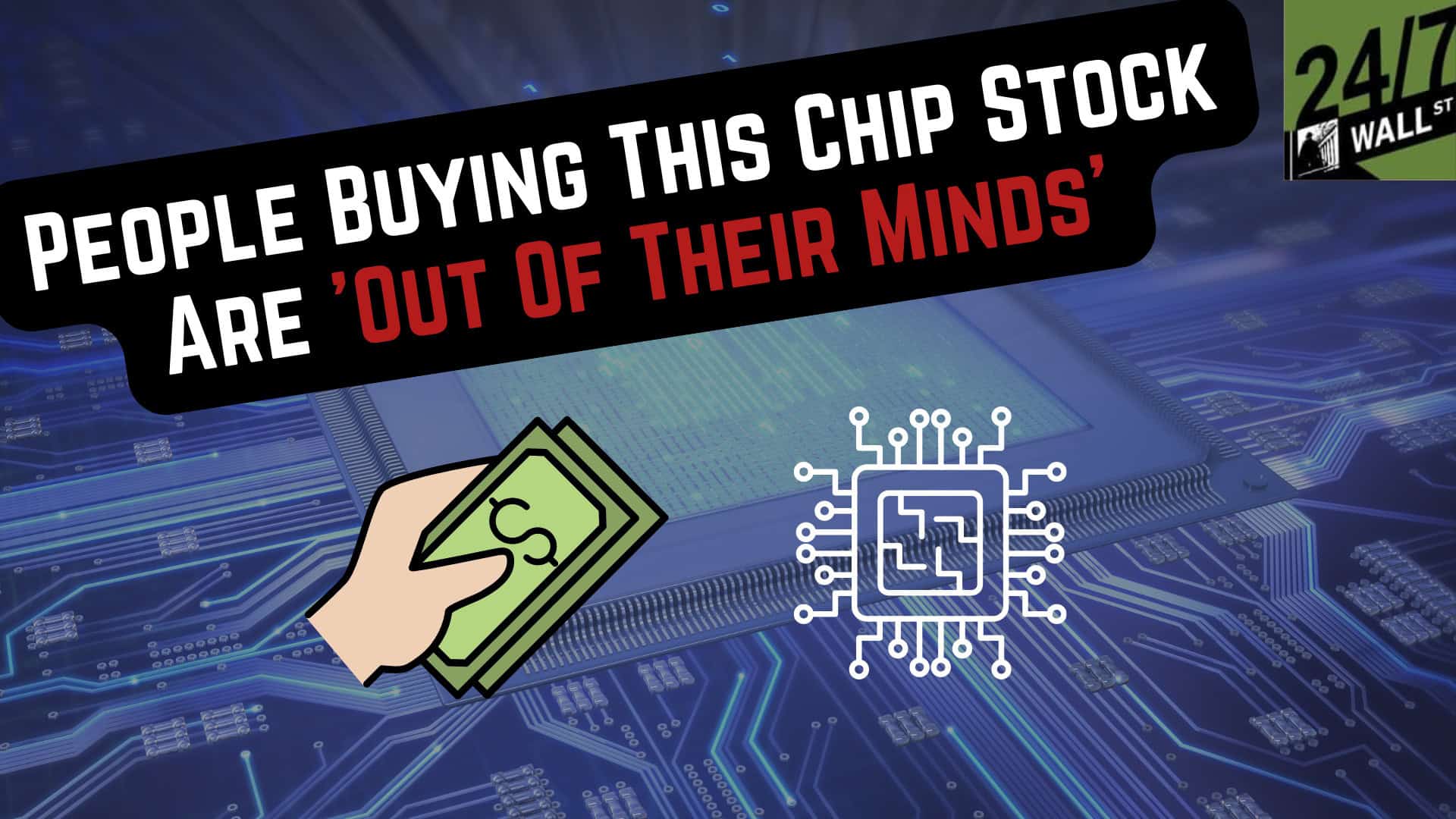Investing
People Buying This Chip Stock Are 'Out of Their Minds'

Published:
Last Updated:

Lee and Doug discuss the challenges facing Intel, particularly in light of potential acquisition talks with Qualcomm (NASDAQ: QCOM) and interest from private equity firm Apollo (NYSE: APO). They note that Intel (NASDAQ: INTC), once a dominant player in the chip industry, has struggled due to missing opportunities in the smartphone and AI chip markets. The conversation highlights the difficulties of a potential Qualcomm-Intel merger, given their different focuses in the chip industry, and expresses skepticism about the benefits of such a merger. Both agree that investing in Intel at this point might be a risky move, considering its current position in the market.
[00:00:00] Douglas A. McIntyre: So Intel was really the premier chip company for 20 or 30 years because chips went into PCs. Yep. They didn’t pay much attention to the smartphone chip market and they didn’t pay any attention of substance to graphics chips. And eventually graphics chips were the father. Of AI chips. If you were, especially in NVIDIA.
[00:00:28] Douglas A. McIntyre: Yeah, absolutely. So you were, you know, they were on the path to get to AI Intel wasn’t. So now Intel has absolutely been slaughtered and you’ve got two things happening, depending on what newspaper you read and everything else. One is a, is the Qualcomm, which traditionally was a much smaller company. And not nearly as important in the marketplace, maybe talking to them about buying Intel.
[00:00:54] Douglas A. McIntyre: And the other one is that Apollo, which is people don’t know it. It’s a private equity company, which means gigantic
[00:01:00] Lee Jackson: private equity company. Yeah.
[00:01:02] Douglas A. McIntyre: Which means that they, they do transactions to buy all their pieces of companies that aren’t public. And I would say, you know, they, they don’t like to own, if they can avoid it, something that’s public.
[00:01:14] Douglas A. McIntyre: In this case, they may end up. Having a piece of Intel, but what it, I mean, other than the fact that Intel’s in a lot of trouble, what does it tell you that Qualcomm could come in and potentially buy them?
[00:01:26] Lee Jackson: You know, I, I read numerous things that some people say, uh, it’ll be hard to get the pieces put together and, you know, will regulators make them.
[00:01:34] Lee Jackson: Sell off some, you know portions of the company. I think it’ll be a tough merger simply because they’re they’re Diametrically different chip companies. I mean qualcon is always focused on on wavelength and and you know band bandwidth and products for cell phones and things of that nature and you know, how do you merge that with a Uh, chip company that basically designs new chips for like, as you said, PCs and, and laptops.
[00:02:05] Lee Jackson: And it’ll be interesting to see because now the discussion has come back up. Well, do we pour billions into opening up a foundry and, and our own fab plants so we can produce chips? And, and it’s like. That’s going to cost a lot of money. So I, it’s funny, the stock rallied. I think a lot of it was, um, a lot of it was probably short covering because the shorts have been leaning on it for a year because it’s been cut in half, so it’ll be interesting to see how this plays out.
[00:02:32] Lee Jackson: I think the Qualcomm merger would be extremely difficult.
[00:02:35] Douglas A. McIntyre: It’s also a weird
[00:02:36] Lee Jackson: merger
[00:02:37] Douglas A. McIntyre: to this extent. Yeah. If you were to say, what’s the old, old chip business, that’s PC chips. What is the sort of old? Yeah. That’s phone chips. Adding Qualcomm and Intel together does not get you to be AMD or NVIDIA. And there’s, what’s the play that investors look at and say, merging these two companies somehow leapfrogs them into the future of the chip business, which is AI and.
[00:03:07] Douglas A. McIntyre: Overnight, the merger is sort of the next AMD. The fact of the matter is that isn’t how this works.
[00:03:13] Lee Jackson: I can’t see that happening unless there’s something that is buried deep in either Intel or Qualcomm where, you know, their designers and engineers are working on that product. But, um, and maybe they can combine it together or something of that nature.
[00:03:29] Lee Jackson: Intel is a sprawling, huge company and how they merge or especially, and especially Qualcomm’s the buyer. And it’s not like a merger of, of two companies. I think it’ll be very difficult. And Qualcomm’s probably better situated just to stay where they are.
[00:03:49] Douglas A. McIntyre: So this, I mean, my final opinion on this is very simple.
[00:03:54] Douglas A. McIntyre: Anybody who puts money into Intel, either via merger, via loan, via buying equity, that company or person is out of their minds.
[00:04:07] Lee Jackson: Well, and if Intel doesn’t do something drastic, there, there’s an indice that they will probably get removed from. Yeah.
Start by taking a quick retirement quiz from SmartAsset that will match you with up to 3 financial advisors that serve your area and beyond in 5 minutes, or less.
Each advisor has been vetted by SmartAsset and is held to a fiduciary standard to act in your best interests.
Here’s how it works:
1. Answer SmartAsset advisor match quiz
2. Review your pre-screened matches at your leisure. Check out the advisors’ profiles.
3. Speak with advisors at no cost to you. Have an introductory call on the phone or introduction in person and choose whom to work with in the future
Thank you for reading! Have some feedback for us?
Contact the 24/7 Wall St. editorial team.